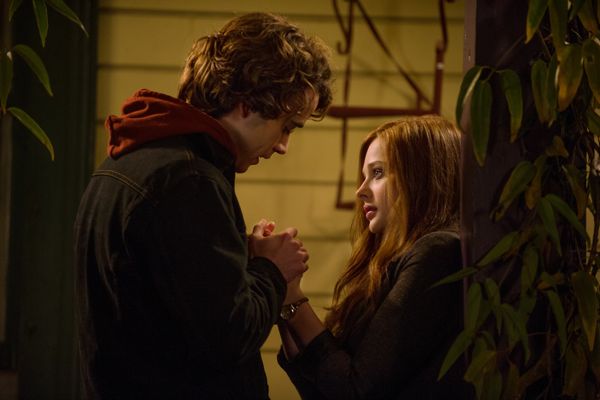
Chemistry is something we tend to take for granted in movies, because couples are generally vetted through screen tests before production to make sure those sparks fly. But what happens when the on-screen couple—the ones who are supposed to be so in loooove—don’t have any chemistry? You end up with a film that looks a bit like If I Stay.
Chloë Grace-Moretz, the brilliant child actress who seems to be struggling a bit as she transitions into more grown-up roles, plays sixteen-year-old Mia (Moretz), a talented cellist who falls hard for Adam (Jamie Blackley), the lead singer of an indie rock band. It’s a classic case of opposites attract—she’s a little bit classical; he’s a whole lot of rock and roll. But they just can’t stay away from each other.
Except for one thing: Moretz actually has better chemistry with the actors who play her free-spirited parents (Mareille Enos and Joshua Leonard) than she does with Blackley. At one point, Adam says, “I’m crazy in love with you” and Mia responds “Me too”—but it’s the most diffident declaration of love you’ve ever seen; the two can barely manage to make eye contact.
I’m not revealing anything that isn’t in the trailer when I say that one afternoon, while driving on a snowy road, Mia and her family get into a car accident. Family members die. Mia herself falls into a coma but can observe everything that happens around her in a sort of ghost-like state. “You have to fight,” one nurse keeps imploring her. “It’s up to you now.”
So the movie jumps back and forth between the courtship of Mia and Adam and the aftermath of the horrific crash. We see Mia and Adam fall in love, have sex, have fights. We see Mia’s earthy and loving, if overly idealized, family. We see Adam on stage with his band, as Mia watches in the wings, singularly uninterested. We find out that, before the accident, Mia auditioned for Julliard.
A few notes on the cello playing in this movie. I play cello myself so I was pretty skeptical about Moretz’s ability to convince me she could actually play. But, through the magic of body doubles and CGI, she and the filmmakers pull it off, brilliantly. The cello doesn’t look awkward in her hands and the fingerings, the bow strokes, the vibrato, all look legit.
But I do have one major objection. We get to hear Mia play several times: a Bach suite, a Beethoven sonata, a bit of Tchaikovsky’s Rococo Variation. Yay! And she plays them flawlessly. I mean, if I didn’t know better, I’d say that Mia wasn’t an aspiring young artist but a world-renowned concert cellist. Oh wait? You say that Mia’s cello part actually WAS played by a world-renowned concert cellist, 61-year-old Maria Kliegel? Huh. Note to future filmmakers: Precocious young musicians applying to Julliard sound great. But they don’t sound like world-class pros—fix it.
As for the film, partly because of the lack of chemistry between the two leads, but also because of the jagged timeline, it never drew me in. I should’ve been blubbering right? I mean, teen love. Dead family members. Life or death choices? Cello music! But I only cried once in the entire film. That was when Mia’s grandfather (Stacy Keach) sat vigil next to her hospital bed and told her that he desperately wanted her to stay, but he would understand if she didn’t. I didn’t know much about Mia’s grandfather (he’s a sketchily written character at best), but Keach at least made me feel the grandfather’s pain.
